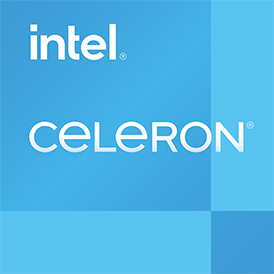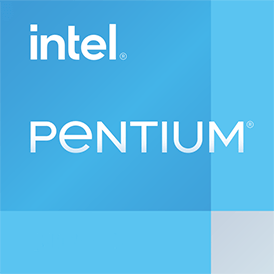
Intel Celeron N3050 vs Intel Pentium N3710
Last updated:
CPU comparison with benchmarks

|
 |

|
| Intel Celeron N3050 | Intel Pentium N3710 | |
CPU comparisonIntel Celeron N3050 or Intel Pentium N3710 - which processor is faster? In this comparison we look at the differences and analyze which of these two CPUs is better. We compare the technical data and benchmark results.
The Intel Celeron N3050 has 2 cores with 2 threads and clocks with a maximum frequency of 2.16 GHz. Up to 8 GB of memory is supported in 2 memory channels. The Intel Celeron N3050 was released in Q2/2015. The Intel Pentium N3710 has 4 cores with 4 threads and clocks with a maximum frequency of 2.56 GHz. The CPU supports up to 8 GB of memory in 2 memory channels. The Intel Pentium N3710 was released in Q1/2016. |
||
| Intel Celeron (165) | Family | Intel Pentium (150) |
| Intel Celeron J3000/N3000 (10) | CPU group | Intel Pentium J3000/N3700 (3) |
| 8 | Generation | 7 |
| Braswell | Architecture | Braswell |
| Mobile | Segment | Desktop / Server |
| -- | Predecessor | -- |
| -- | Successor | -- |
|
|
||
CPU Cores and Base FrequencyThe Intel Celeron N3050 is a 2 core processor with a clock frequency of 1.60 GHz (2.16 GHz). The Intel Pentium N3710 has 4 CPU cores with a clock frequency of 1.60 GHz (2.56 GHz). |
||
| Intel Celeron N3050 | Characteristic | Intel Pentium N3710 |
| 2 | Cores | 4 |
| 2 | Threads | 4 |
| normal | Core architecture | normal |
| No | Hyperthreading | No |
| No | Overclocking ? | No |
| 1.60 GHz | Frequency | 1.60 GHz |
| 2.16 GHz | Turbo Frequency (1 Core) | 2.56 GHz |
| 2.16 GHz | Turbo Frequency (All Cores) | 2.56 GHz |
Internal GraphicsThe integrated graphics unit of a processor is not only responsible for the pure image output on the system, but can also significantly increase the efficiency of the system with the support of modern video codecs. |
||
| Intel HD Graphics 400 | GPU | Intel HD Graphics 405 (16EU) |
| 0.32 GHz | GPU frequency | 0.40 GHz |
| 0.60 GHz | GPU (Turbo) | 0.70 GHz |
| 8 | GPU Generation | 8 |
| 14 nm | Technology | 14 nm |
| 3 | Max. displays | 3 |
| 12 | Compute units | 16 |
| 96 | Shader | 128 |
| No | Hardware Raytracing | No |
| No | Frame Generation | No |
| 8 GB | Max. GPU Memory | 8 GB |
| 12 | DirectX Version | 12 |
Hardware codec supportA photo or video codec that is accelerated in hardware can greatly accelerate the working speed of a processor and extend the battery life of notebooks or smartphones when playing videos. |
||
| Intel HD Graphics 400 | GPU | Intel HD Graphics 405 (16EU) |
| No | Codec h265 / HEVC (8 bit) | No |
| No | Codec h265 / HEVC (10 bit) | No |
| Decode / Encode | Codec h264 | Decode / Encode |
| No | Codec VP9 | No |
| Decode | Codec VP8 | Decode |
| No | Codec AV1 | No |
| Decode / Encode | Codec AVC | Decode / Encode |
| Decode | Codec VC-1 | Decode |
| Decode | Codec JPEG | Decode |
Memory & PCIeThe Intel Celeron N3050 supports a maximum of 8 GB of memory in 2 memory channels. The Intel Pentium N3710 can connect up to 8 GB of memory in 2 memory channels. |
||
| Intel Celeron N3050 | Characteristic | Intel Pentium N3710 |
| DDR3L-1600 | Memory | DDR3-1600 |
| 8 GB | Max. Memory | 8 GB |
| 2 (Dual Channel) | Memory channels | 2 (Dual Channel) |
| 25.6 GB/s | Max. Bandwidth | 25.6 GB/s |
| No | ECC | No |
| -- | L2 Cache | -- |
| 2.00 MB | L3 Cache | 2.00 MB |
| 2.0 | PCIe version | 2.0 |
| 4 | PCIe lanes | 4 |
| 2.0 GB/s | PCIe Bandwidth | 2.0 GB/s |
Thermal ManagementThe TDP (Thermal Design Power) of a processor specifies the required cooling solution. The Intel Celeron N3050 has a TDP of 6 W, that of the Intel Pentium N3710 is 6 W. |
||
| Intel Celeron N3050 | Characteristic | Intel Pentium N3710 |
| 6 W | TDP (PL1 / PBP) | 6 W |
| -- | TDP (PL2) | -- |
| -- | TDP up | -- |
| 4 W | TDP down | 4 W |
| 90 °C | Tjunction max. | 90 °C |
Technical detailsThe Intel Celeron N3050 has a 2.00 MB cache, while the Intel Pentium N3710 cache has a total of 2.00 MB. |
||
| Intel Celeron N3050 | Characteristic | Intel Pentium N3710 |
| 14 nm | Technology | 14 nm |
| Monolithic | Chip design | Monolithic |
| x86-64 (64 bit) | Instruction set (ISA) | x86-64 (64 bit) |
| SSE4.1, SSE4.2 | ISA extensions | SSE4.1, SSE4.2 |
| BGA 1170 | Socket | BGA 1170 |
| VT-x, VT-x EPT | Virtualization | VT-x, VT-x EPT |
| Yes | AES-NI | Yes |
| Windows 10, Linux | Operating systems | Windows 10, Linux |
| Q2/2015 | Release date | Q1/2016 |
| -- | Release price | 50 $ |
| show more data | show more data | |
Rate these processors
Average performance in benchmarks
⌀ Single core performance in 3 CPU benchmarks
⌀ Multi core performance in 5 CPU benchmarks
Geekbench 5, 64bit (Single-Core)
Geekbench 5 is a cross plattform benchmark that heavily uses the systems memory. A fast memory will push the result a lot. The single-core test only uses one CPU core, the amount of cores or hyperthreading ability doesn't count.
|
|
Intel Celeron N3050
2C 2T @ 2.16 GHz |
||
|
|
Intel Pentium N3710
4C 4T @ 2.56 GHz |
||
Geekbench 5, 64bit (Multi-Core)
Geekbench 5 is a cross plattform benchmark that heavily uses the systems memory. A fast memory will push the result a lot. The multi-core test involves all CPU cores and taks a big advantage of hyperthreading.
|
|
Intel Celeron N3050
2C 2T @ 2.16 GHz |
||
|
|
Intel Pentium N3710
4C 4T @ 2.56 GHz |
||
Geekbench 6 (Single-Core)
Geekbench 6 is a benchmark for modern computers, notebooks and smartphones. What is new is an optimized utilization of newer CPU architectures, e.g. based on the big.LITTLE concept and combining CPU cores of different sizes. The single-core benchmark only evaluates the performance of the fastest CPU core, the number of CPU cores in a processor is irrelevant here.
|
|
Intel Celeron N3050
2C 2T @ 2.16 GHz |
||
|
|
Intel Pentium N3710
4C 4T @ 2.56 GHz |
||
Geekbench 6 (Multi-Core)
Geekbench 6 is a benchmark for modern computers, notebooks and smartphones. What is new is an optimized utilization of newer CPU architectures, e.g. based on the big.LITTLE concept and combining CPU cores of different sizes. The multi-core benchmark evaluates the performance of all of the processor's CPU cores. Virtual thread improvements such as AMD SMT or Intel's Hyper-Threading have a positive impact on the benchmark result.
|
|
Intel Celeron N3050
2C 2T @ 2.16 GHz |
||
|
|
Intel Pentium N3710
4C 4T @ 2.56 GHz |
||
iGPU - FP32 Performance (Single-precision GFLOPS)
The theoretical computing performance of the internal graphics unit of the processor with simple accuracy (32 bit) in GFLOPS. GFLOPS indicates how many billion floating point operations the iGPU can perform per second.
|
|
Intel Celeron N3050
Intel HD Graphics 400 @ 0.60 GHz |
||
|
|
Intel Pentium N3710
Intel HD Graphics 405 (16EU) @ 0.70 GHz |
||
Estimated results for PassMark CPU Mark
Some of the CPUs listed below have been benchmarked by CPU-monkey. However the majority of CPUs have not been tested and the results have been estimated by a CPU-monkey’s secret proprietary formula. As such they do not accurately reflect the actual Passmark CPU mark values and are not endorsed by PassMark Software Pty Ltd.
|
|
Intel Celeron N3050
2C 2T @ 2.16 GHz |
||
|
|
Intel Pentium N3710
4C 4T @ 2.56 GHz |
||
CPU-Z Benchmark 17 (Multi-Core)
The CPU-Z benchmark measures a processor's performance by measuring the time it takes the system to complete all benchmark calculations. The faster the benchmark is completed, the higher the score.
|
|
Intel Celeron N3050
2C 2T @ 1.60 GHz |
||
|
|
Intel Pentium N3710
4C 4T @ 1.60 GHz |
||
Cinebench R15 (Single-Core)
Cinebench R15 is the successor of Cinebench 11.5 and is also based on the Cinema 4 Suite. Cinema 4 is a worldwide used software to create 3D forms. The single-core test only uses one CPU core, the amount of cores or hyperthreading ability doesn't count.
|
|
Intel Celeron N3050
2C 2T @ 2.16 GHz |
||
|
|
Intel Pentium N3710
4C 4T @ 2.56 GHz |
||
Cinebench R15 (Multi-Core)
Cinebench R15 is the successor of Cinebench 11.5 and is also based on the Cinema 4 Suite. Cinema 4 is a worldwide used software to create 3D forms. The multi-core test involves all CPU cores and taks a big advantage of hyperthreading.
|
|
Intel Celeron N3050
2C 2T @ 2.16 GHz |
||
|
|
Intel Pentium N3710
4C 4T @ 2.56 GHz |
||
Cinebench R20 (Single-Core)
Cinebench R20 is the successor of Cinebench R15 and is also based on the Cinema 4 Suite. Cinema 4 is a worldwide used software to create 3D forms. The single-core test only uses one CPU core, the amount of cores or hyperthreading ability doesn't count.
|
|
Intel Celeron N3050
2C 2T @ 2.16 GHz |
||
|
|
Intel Pentium N3710
4C 4T @ 2.56 GHz |
||
Cinebench R20 (Multi-Core)
Cinebench R20 is the successor of Cinebench R15 and is also based on the Cinema 4 Suite. Cinema 4 is a worldwide used software to create 3D forms. The multi-core test involves all CPU cores and taks a big advantage of hyperthreading.
|
|
Intel Celeron N3050
2C 2T @ 2.16 GHz |
||
|
|
Intel Pentium N3710
4C 4T @ 2.56 GHz |
||
Devices using this processor |
|
| Intel Celeron N3050 | Intel Pentium N3710 |
| Unknown | Unknown |
Popular comparisons containing this CPUs
back to index








